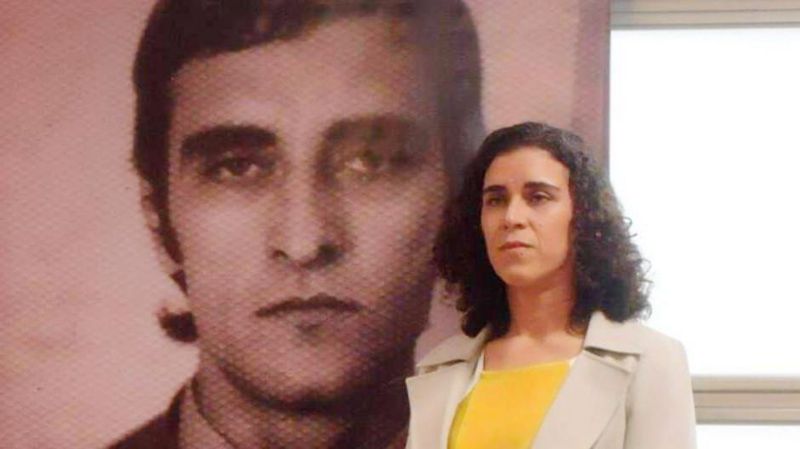Latin America
Related: About this forum'I fought for years to correct my dad's death certificate - but still haven't buried him'
4 days ago
Sofia Ferreira Santos
BBC News

Tessa Moura Lacerda
Tessa Moura Lacerda is a philosophy professor at the University of São Paulo
"Have we really done it?" Tessa Moura Lacerda asked her mother, in disbelief, as they stood outside a government office on a rainy August morning in 2019.
In their hands, a document they fought for years to hold - her father's death certificate, now correctly stating his cause of death.
It read: "unnatural, violent death caused by the State to a missing person [...] in the dictatorial regime established in 1964".
Tessa's father, Gildo Macedo Lacerda, died under torture in 1973 at just 24, during the most brutal years of Brazil's military dictatorship.
Over more than two decades, at least 434 people were killed or disappeared, with thousands more detained and tortured, a national truth commission found.
More:
https://www.bbc.com/news/articles/ce8npx2r8y8o
(You may recall that President Lula da Silva's first Vice President, from his first term, years ago, Dilma Rousseff, was, herself a political prisoner, and tortured extensively by the dictatorship.

Dilma Rousseff appears before a military court in Rio de Janeiro in 1970, while her military accusers hide their faces.
ARCHIVO NACIONAL DE LA COMISIÓN DE LA VERDAD
Judi Lynn
(164,079 posts)Sixty years have passed since the 1964 military coup, an event that current President Lula would rather not mark with any ceremony so as not to further strain his relationship with the military

NAIARA GALARRAGA GORTÁZAR
São Paulo - APR 01, 2024 - 10:16 EDT
On the night of March 31, 1964, the Brazilian military deposed the legitimate president, the leftist João Goulart, in a bloodless coup. A dictatorship began that would last more than two decades. In the midst of the Cold War, the elites were furiously anti-communist and Goulart promised agrarian reform and public policies for the working class. Four years later, the generals closed Congress and toughened repression through Institutional Act number 5. Brazil would not return to democracy until 1985.
For the many supporters of the coup, it was a revolution so that Brazil did not fall into the clutches of communism, in an interpretation of the constitutional breakdown backed by far-right ex-president Jair Bolsonaro. During his presidency, the 1964 coup was officially celebrated in the military. The current president, the leftist Luiz Inácio Lula da Silva, wants the events of 60 years ago to be marked with a low-key anniversary so as not to ruffle any feathers in the Armed Forces. The president is treading carefully, as Bolsonaro and several military officials have been accused of plotting a coup in the most serious attack on democracy since the end of the dictatorship. Their alleged actions indirectly resulted in the assault on the headquarters of the three branches of government in Brasília in January 2023.
This is a review of some of the key moments from the military regime and the transition to democracy.
. . .
Murder of Indigenous people
The Truth Commission did not include Indigenous people in the official number of those murdered by the dictatorship, but it did record that at least 8,350 died due to the acts or omissions of state agents between 1946-1985. They killed them to plunder their lands or to evict them. They died from contracting diseases they had not been vaccinated against and from torture and mistreatment in prison. With thousands of deaths each, the towns of Cinta-Larga and Waimiri-Atroari were the most affected.
The most detailed information about the ruthless persecution of Indigenous people at that time is an official report prepared in 1967 and which was missing for almost half a century. The Figueiredo Report concluded that “withholding assistance is the most effective way to commit murder. Hunger, plague, and mistreatment are decimating brave and strong people.”
After traveling nearly 10,000 miles, prosecutor Jader de Figueiredo prepared a chilling document of more than 5,000 pages that took his name. “The Indian Protection Service has degenerated to such an extent that it persecutes them to the point of extermination,” he wrote. The military’s policy to clear the Amazon included machine-gunning from the air, launching explosives, smallpox inoculation, and donations of sugar mixed with strychnine. In 2013, a researcher, Marcelo Zelic, rescued the report from oblivion in the government archives and disclosed its brutal content.
More:
https://english.elpais.com/international/2024-04-01/brazils-dictatorship-repression-torture-slaughter-of-indigenous-people-and-censorship.html
